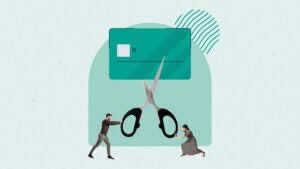Survey: 2 out of 5 Americans aren’t ready for next recession

The U.S. economy is starting to show some troubling signs — and many Americans say they’re not at all prepared for what might come next.
Two in 5 Americans (or 40 percent) aren’t ready for an economic downturn if it were to occur within the next six to 12 months, according to Bankrate’s October Financial Security Poll. Nearly a quarter of those respondents (or 24 percent) said they were not very prepared, while 16 percent said they were not prepared at all.
The lack of readiness comes at a time when the U.S. economy looks like it’s beginning to wobble. Though employers in the U.S. have added jobs for almost nine-years straight (albeit at a weaker pace), manufacturers posted their steepest decline in 10 years, as the U.S.-China trade war weighs on the sector. Economists say that weakness may soon spill over to the services sector, if it hasn’t already.
Meanwhile, the Federal Reserve has cut interest rates at two-straight meetings to cushion the economy. Amid the weak data, experts are betting that another cut is on the table when the Fed meets again in two weeks, according to CME Group’s FedWatch.
Though the financial system looks like it’s intact for now, there’s no way to know where a downturn will come from or when it will happen. Experts say that most preparation should happen while the economy is still on firm footing.
“This is where a lot of Americans need to learn to flex their financial muscles,” says Megan Gorman, founding partner of Chequers Financial Management, a San Francisco-based financial planning firm. “Most Americans are reactive to their money, and they are not proactive. You should always be preparing for downside risk.”
Experts recommend boosting savings, paying off credit card debt
The solid U.S. economy will not last forever. Experts say there’s a 41 percent chance that the U.S. economy will enter into a recession between now and the 2020 elections, according to Bankrate’s Third-Quarter Economic Indicator survey.
Many Americans have taken note. Sixty percent of respondents in Bankrate’s nationally representative poll said they’re prepared for a downturn. Nineteen percent of those respondents say they’re very prepared, while 41 percent noted that they’re somewhat prepared.
Bankrate commissioned YouGov Plc to carry out the survey online. Interviews were conducted from Sept. 25-27, which surveyed 2,605 adults.
Experts suggest that Americans pay off high-cost debt and boost their emergency savings to prepare for a recession. That’s because, as demand falls, many firms choose to scale back on hours or lay off employees. An emergency fund could help many Americans if the downturn leaves them strapped for cash, while a lower credit card balance could prevent Americans from falling behind on debt if they lose an income stream.
“Saving more for emergencies and paying down credit card debt are especially important steps to be taking, as fewer than one in five households has sufficient emergency savings and the average credit card rate is over 17 percent,” says Greg McBride, CFA, Bankrate’s chief financial analyst.
To prepare for a recession, Americans choose to cut back on spending
But the Bankrate poll found that the most common recession preparation step for Americans is spending less money. This financial step was the most common answer for all age groups and income brackets, as well as for those working part time or full time, according to the findings.
“This is notable,” McBride says, “because more than two-thirds of economic output is tied to consumer spending.” Economists note that consumption is one of the main reasons why the longest economic expansion on record has stayed intact. Should it falter, the economy might be in trouble.
Middle-income brackets (or those making between $40,000 and $80,000 a year) were most likely to be cutting back on spending, with nearly half (or 48 percent) of the income group preferring this financial step. Of the age groups, older millennials (or those aged 30-38) were the most likely to spend less money. Younger baby boomers (55-64) and Gen Z (18-22) were tied for the second most likely.
Even though it’s not the financial step experts first recommend, it’s not as if cutting back on spending is a bad way to prepare for a downturn, says Barbara O’Neill, CFP, a professor affiliated with Rutgers University’s Cooperative Extension. That’s because you could use that leftover cash to grow your savings.
Consider automatically taking a portion out of your paycheck each month or even finding a savings account that will regularly transfer money from your checking account. Use Bankrate’s tools to find the best savings account option for you.
“The savings has to come from somewhere, and it’s going to have to come from reduced spending,” O’Neill says. “If you’re going to be cutting spending to free up money to save in order to really make it happen, it’s best if you have it done automatically.”
Smaller percentage of Americans save for emergencies, pay off debt
But spending less isn’t the only recession preparation step Americans are taking. Nearly one-third of respondents say they’re boosting their emergency savings.
That response, however, differs by income bracket and age. Those making less than $40,000, for example, were less likely to be saving than their counterparts in higher income brackets, the poll found. Gen Z, millennials and Gen X, meanwhile, were more likely than baby boomers and the silent generation to be building up a cash cushion.
At the same time, 31 percent of respondents said they were paying down their credit card debt. This recession preparation step was most common among individuals making between $50,000 and $79,999, as well as baby boomers and Gen X. Those with full-time work were also more likely to be paying down credit card debt than those who worked part time.
Of the more obscure recession preparation steps, 15 percent of Americans said they were saving more for retirement. But even though it was one of the least common responses, its respondents seemed to be the most confident bunch. Seventy-eight percent of those who were saving more for retirement felt prepared for a recession.
The Bankrate poll also found that 10 percent of respondents were preparing for a recession by looking for a better job, while 4 percent chose “other,” such as paying off their mortgage, pursuing a graduate degree or looking for a second job.
Of the generations, 74 percent of millennials were taking action to prepare for an downturn, the most of any age group, the poll found. That was followed by Gen X (70 percent), baby boomers (67 percent), Gen X (66 percent) and the silent generation (62 percent).
But that doesn’t mean millennials are the ones who feel most prepared. Just 55 percent of millennials said they were prepared, compared with 57 percent of Gen Xers, 66 percent of baby boomers and 78 percent of the silent generation.
Americans with higher income more likely to feel prepared
Americans’ preparedness also steadily falls as income brackets decrease. Nearly 8 in 10 (or 78 percent) of Americans who make $80,000 or more said they were prepared for a recession. Yet, of those who make less than $40,000, only slightly more than half (or 52 percent) say they are ready.
These statistics underscore how hard it is to plan for the future when you’re already trying to make ends meet on a day-to-day basis, O’Neill says.
“If you’re comfortable financially, you have the ability to look ahead. You’re more goal-oriented because your day-to-day spending is under control,” she says. “You can pay your bills, and you’re not in a lot of debt, but when you have very volatile income — particularly when it’s a low and moderate income — you’re focused on the day-to-day and maybe on the crisis of the day, too.”
This lack of preparedness could also be due, in part, to the number of Americans who are still feeling the lingering effects of the Great Recession. A Bankrate survey from June found that nearly 48 percent of Americans who were adults at the time of the 2007-2009 downturn saw no improvement in their finances. Most of the individuals who saw improvement were concentrated in the top income bracket ($80,000 or more a year).
At the same time, 31 percent of Americans aren’t taking any steps at all to prepare for a recession, Bankrate’s poll found. Nearly half (or 46 percent) of those individuals said they weren’t going to be prepared for a downturn, should it happen sometime in the next six to 12 months.
That preparation varies by income bracket as well. Thirty-five percent of the lowest earners (or those who make under $30,000 a year) said they are doing nothing in anticipation of a possible recession. That compares with 28 percent of the survey’s highest earners (those making more than $80,000 annually).
For those living paycheck to paycheck, every little bit helps with savings
It’s hard to prepare for a downturn when you’re already trying to make ends meet. Not to mention, building up the expert-recommended cushion of six months’ worth of expenses can be tough when you’re feeling strapped on a month-to-month basis.
[READ: Despite the lowest unemployment rate in 50 years, many remain discouraged]
For those who don’t know where to start, begin by making a log of your expenses. Identify any spending that’s purely discretionary — or services and items that you don’t need. Experts typically recommend spending no more than 30 percent of your net income (that is, earnings after taxes) on those “wants,” based on the 50-30-20 budget rule. To build up a pool of money, you could eliminate some of those items.
It’s also critically important to live within your own means. Based on that same rule, experts recommend spending no more than 50 percent of your net income on “hard-core commitments,” such as rent, groceries, car payments, etc.
And it’s better to just start somewhere, O’Neill says. Even if you’re only putting away $1 a day, that’s still going to be about $30 by the end of the month — more than you would’ve had if you hadn’t started to save.
Technology can also provide an advantage, she says. Consider using an app that rounds up your purchases to the dollar and then deposits that change into a savings account.
“It’s mindless,” O’Neill says. “You don’t even see the money.”
You may also want to consider working with a financial counselor, money coach or an expert at a nonprofit credit agency who can help you get out of the paycheck-to-paycheck cycle, O’Neill says. They can help you with day-to-day money management or even with crisis situations. They may also point you toward community resources that can help you save even more, such as food banks or reduced-cost health clinics.
“Make sure you know about all of the resources in your community,” O’Neill says. “They can be very helpful in times of stress.”
But even then, you may want to consider more drastic measures. Actions such as switching your career, pursuing additional education, moving to an area where the job market is stronger, finding a roommate or picking up a side job may be helpful in getting your financial house back in order.
[READ: How to prepare for the next recession when you’re still feeling the effects of the last one]
Preparing for a recession is an important step. If a downturn happens before you’re ready, it could put you in a tough financial situation.
“We need to ask ourselves, ‘Am I frail financially, and would being in a recession make me feel frailer?’” Gorman says. “That should motivate us. Control the controllable; you can control what you save, and you can control what you spend.”
Methodology
Bankrate commissioned YouGov Plc to conduct the survey. All figures, unless otherwise stated, are from YouGov Plc. Total sample size was 2,605 adults. Fieldwork was undertaken on September 25-27, 2019. The survey was carried out online and meets rigorous quality standards. It employed a non-probability-based sample using both quotas upfront during collection and then a weighting scheme on the back end designed and proven to provide nationally representative results.
Why we ask for feedback Your feedback helps us improve our content and services. It takes less than a minute to complete.
Your responses are anonymous and will only be used for improving our website.






